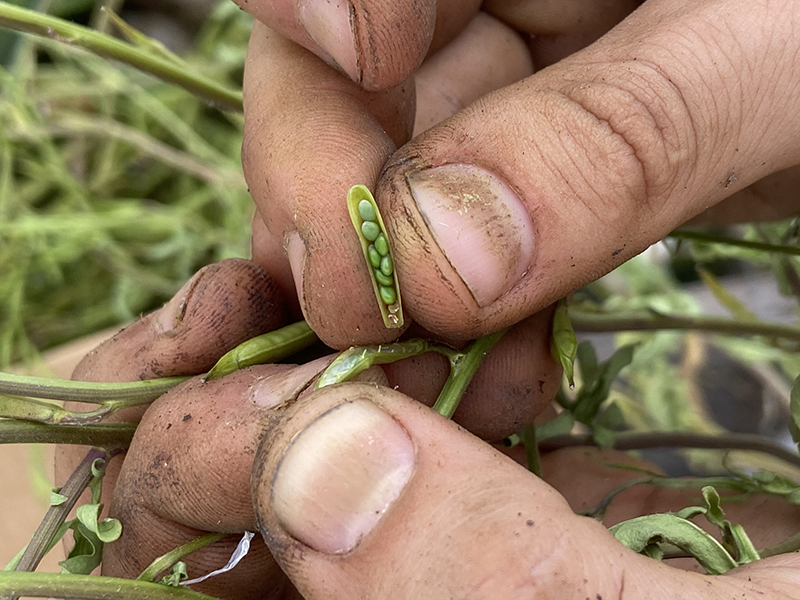During World War II, when canned and processed food was sent to soldiers, Americans planted Victory Gardens. But many people already had a backyard patch of vegetables, along with some chickens. Even a small garden meant some amount of freedom from hunger and, everyone hoped, freedom for the world. After the war, farming changed and became more corporatized. Over the decades, we lost our connection to the land and to each other.
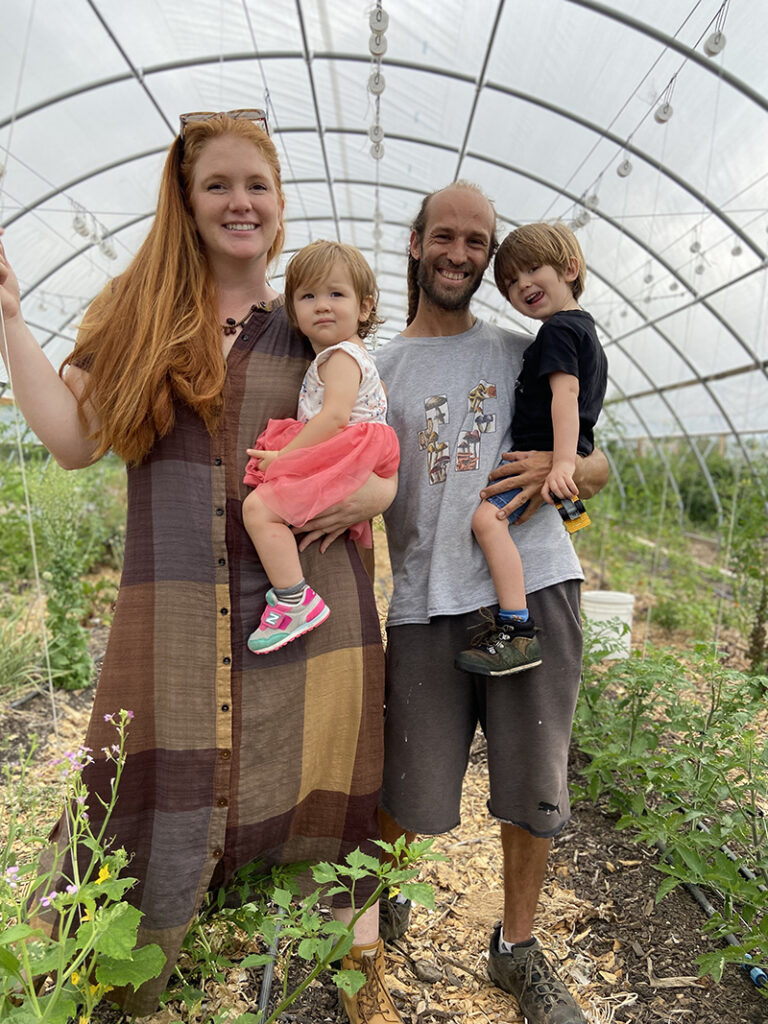
“Farmland is the most valuable land. If there’s not farmland, there won’t be food. There are not enough farmers who want to do it. It’s a very thin world,” said Sylvain Clavieres, founder of Talking Tree Farm. He and his wife, Sarah, are bringing back the old-fashioned ways, farming on four acres of abundance in Schertz.
The name of the farm comes from the fact that trees and other plants have their own way of speaking with each other. “Plants communicate underground, and it changes them genetically, so the next year they’re different,” Sylvain said. “These tomatoes, I’ve been growing them for six years.” That means these tomatoes are a little different from the ones he originally planted, just as grandchildren may resemble one of their forebears, but in a slightly different way. As the plants talk, and the farmers talk, everyone in the ecosystem thrives. “When I experienced it, I thought, ‘This is huge, this is life,’” Sarah said. “I can picture myself growing old here,” Sarah said, turning to her daughter, Juliette. “I want you to taste all the good stuff.”
A San Antonio native, Sarah met Sylvain, who is French, in Thailand, when she was teaching English and he was living off the land. For a few years they lived and farmed off-grid. Through friends of Sarah’s parents, the couple was able to come to Texas and begin sustainable farming here while they lived in a camper. In 2019, they bought this property, moved their family and their plants, and deepened and expanded their permaculture project.
Permaculture integrates agriculture with human culture, creating a system that is self-sustaining.
The Clavieres talk about living with closed loops — operating with zero waste, upcycling and bartering whenever possible. It’s the way things used to be done before we could buy anything and everything online.
Every permaculture project is unique. If you buy tomato seeds from a locally or regionally-based farm, they’ll be adapted to our heat and drought. You can’t say the same for seeds from New Jersey. After harvesting tomatoes or any other crop, the leftovers go to the compost pile, and the compost goes back in the soil to grow more veggies. Saving the seeds completes the loop, ensuring there will be tomatoes for years to come.
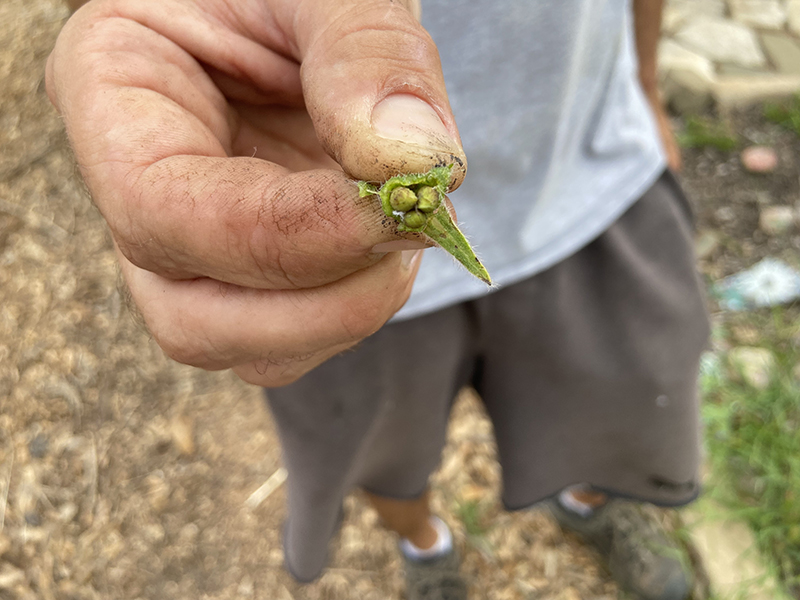
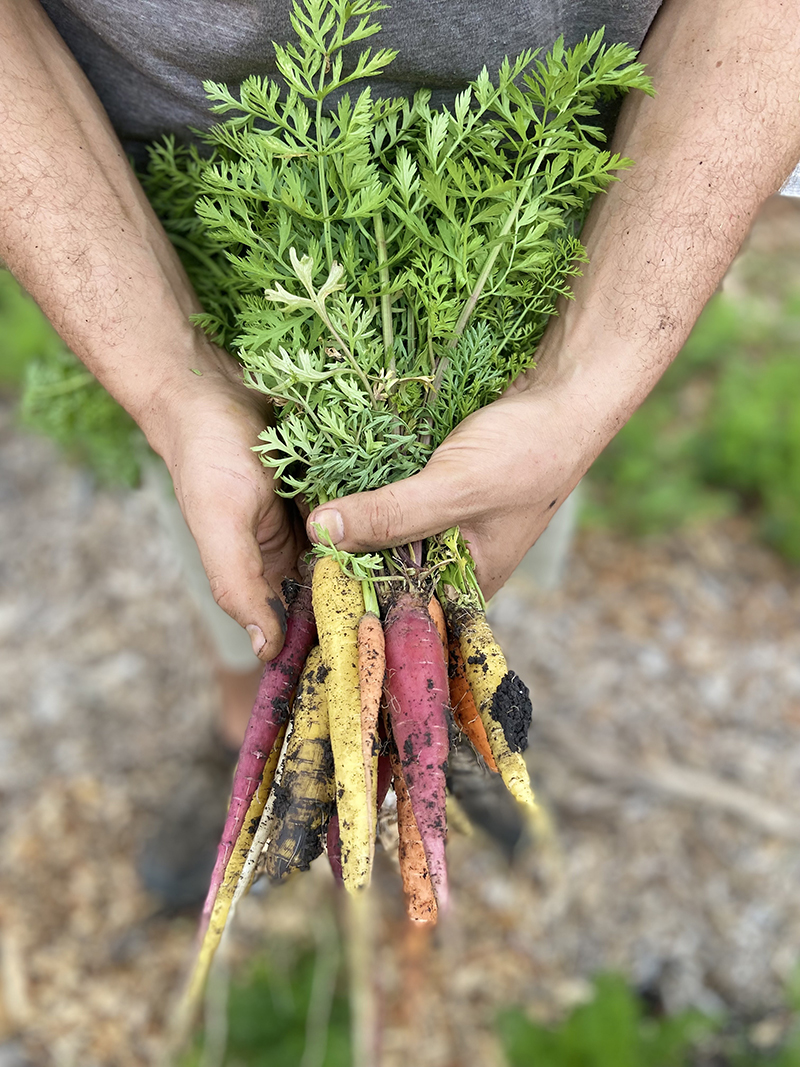
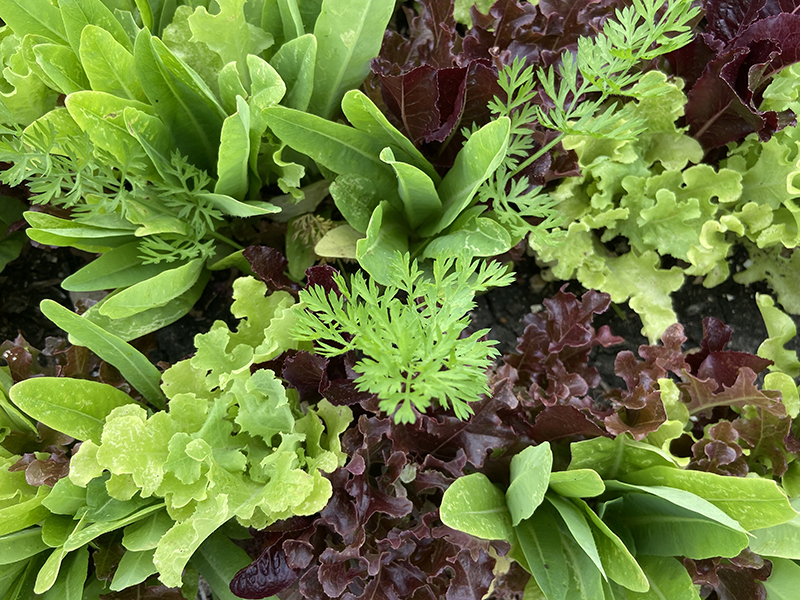
Talking Tree Farm includes several different gardens, including a new experimental one with tropical fruits. “We’ll see how that goes over the winter. I brag about it in spring,” he said.
His keys to a healthy garden? “Water and sun!” Sylvain said. “Everything starts from the soil. We focus on the soil, making the soil healthy. If your soil’s not healthy, there’s no way you can grow any plants on it. It’s like you — if your body’s not healthy.”
Sylvain nourishes the soil not only by adding compost made on site, but also by not tilling or plowing after he plants so the soil structure remains intact and vibrant. He’s built the greenhouses as well as the solar-powered rain catchment system that waters them. He’s passionate about this project, yet remarkably chill. Each decision is made deliberately.
“Everything has to make sense. If there’s a problem, don’t fight it. Find a solution,” he said. That means planting the same vegetable in more than one spot, so if this patch of Swiss chard has pests, no worries. There’s another one over there that’s doing just fine. “So I usually just let it be. If you move the pest, it will just grow somewhere else.”
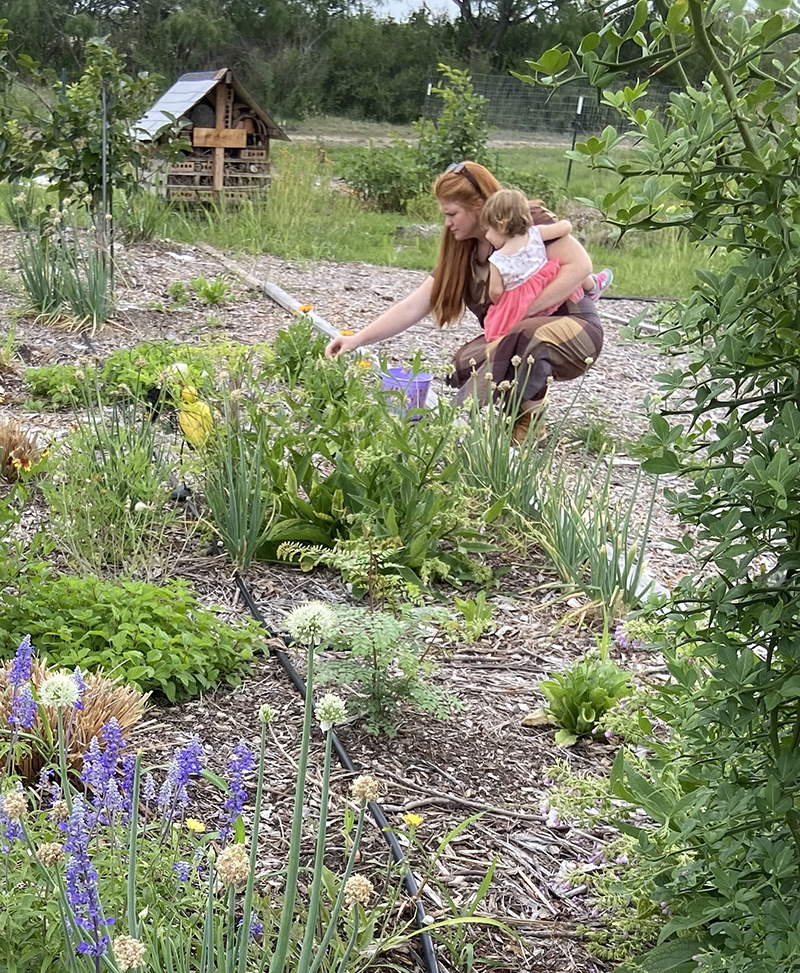
He knows a balanced ecosystem will include both pests and predators, so he feels no need to waste time and money to spread chemicals or to bar every possible entry. “I’d rather work with nature rather than trying to be smarter and work against it. It’s much more efficient,” he said.
Having a diversity of crops, in a diversity of places, and accepting the diversity of wildlife that dwells around them means a healthier farm. And a healthier farmer. “Diversity is the key for everything in your life. Diversity to be able to bounce back,” Sylvain said. “That’s why I like to grow a lot of things. If I have a disease in this crop, that’s fine. I have so many other crops that will make it.”
Efficiency also means training the couple of hundred fruit trees in the farm’s Fruit Forest to literally bloom where they are planted, despite Texas’ harsh summers. “My fruit trees are becoming drought-tolerant and stronger because I do things to put stress on them, like water every two, three days. All my trees are going into their third year.”
Sarah likes that their children are growing up in a close relationship with creation. “Hopefully, that brings peace,” she said. It definitely brings sweet groundcherries to eat right off the vine. It also brings unexpected critters. “I found a spider!” Sarah called to her son, Leo. “He needs a ride in your dump truck!” Leo came running, dump truck in hand.
In 2021, Talking Tree Farm became a co-op. It currently has eight partnerships with like-minded small agricultural businesses. Alan Newman is in charge of the free-range egg production and gathering honey from the farm’s 20 hives. Chef Josh Schwencke offers culinary events. Lynn Stafford is an herbalist and owner of Trava, making small-batch herbal teas and remedies. Betsy Gruy brings her Sugarloose Studio to the farm for mosaic classes. Alma Alycea of Compost Queens is a residential and commercial recycling service in the San Antonio area that processes its product at the farm. Brandon Cauthon gardens for the farmers markets, every Saturday at both the Pearl Farmers Market and the New Braunfels Farmers Market. The newest farmers are Kathryne Short and Dorothy Herbst, who will be offering fresh-cut flowers next season.
And—coming soon—heirloom seeds for sale. “I’m passionate about seed-saving. It’s what drew me to wanting to farm with my husband,” Sarah said. “It grounds me. It goes from death to new life — not one life but literally thousands.”
As the kids grow, she will focus more on harvesting, processing, and packaging seeds. Some she will offer for sale and keep some for preservation.
Texas lags behind other states in developing seed-saving programs, especially of heirloom varieties, which have stood the test of time. Before World War II, the heirlooms in family gardens were tasty, hardy, and beautiful. Heirloom plants are often unusual, like the speckled beans Sylvain grows. Communities across the country are developing seed libraries to preserve seeds and ancient grains before they are lost. Here in Texas, Talking Tree Farm is unique in its dedication to seed preservation. Having seeds ensures food independence even when grocery store shelves are empty. “I will always have food. I will always have something to sell,” Sylvain said. In early May, many plants had already gone to seed. Sylvain demonstrated how to gently obtain seeds from lettuce and how to carefully dry tomato seeds so they can last five to eight years.
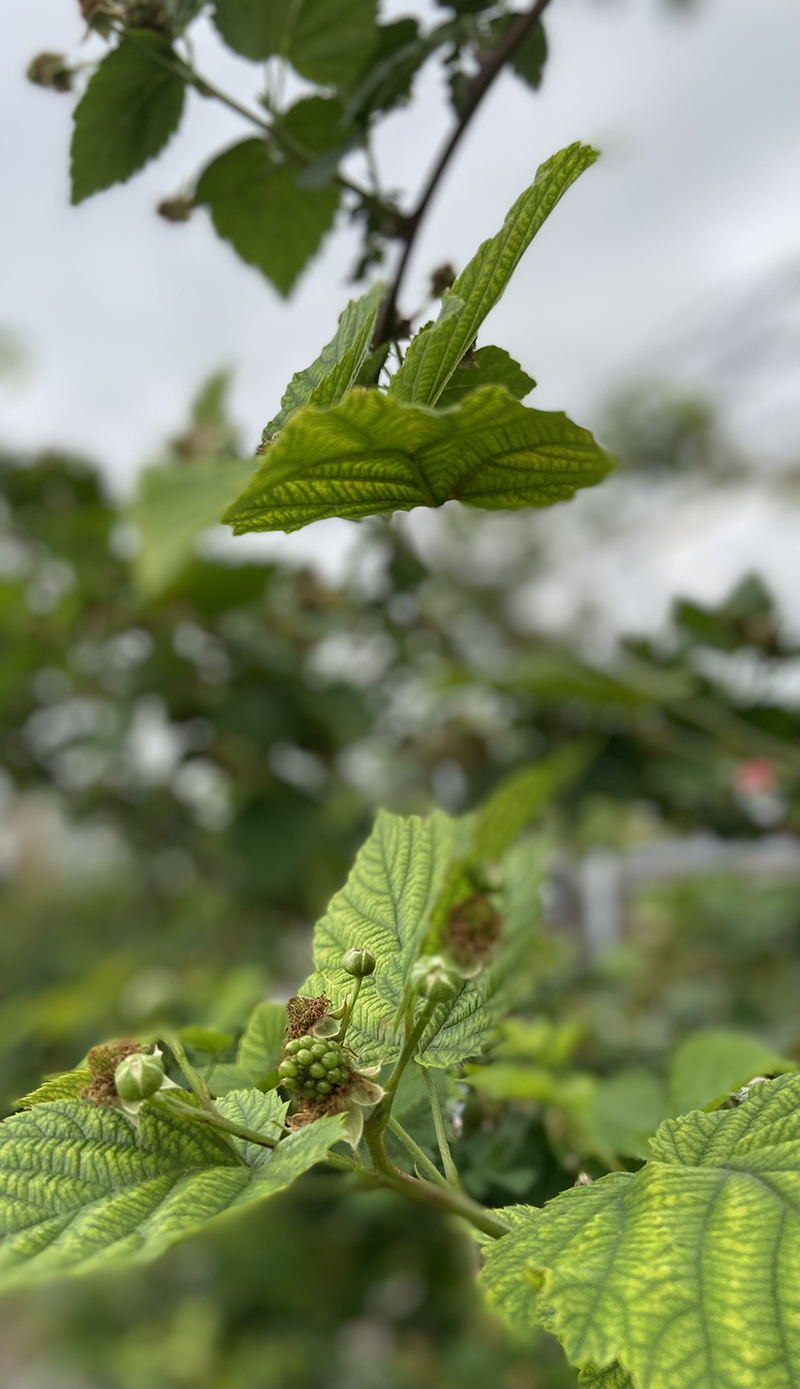
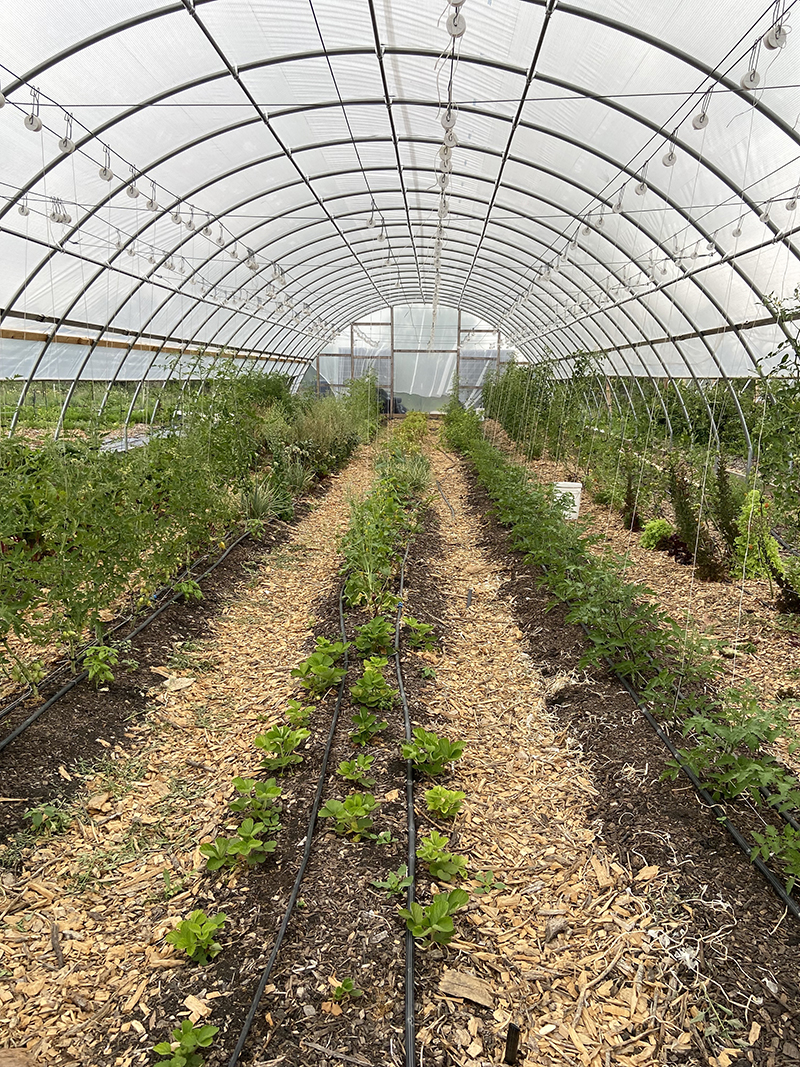
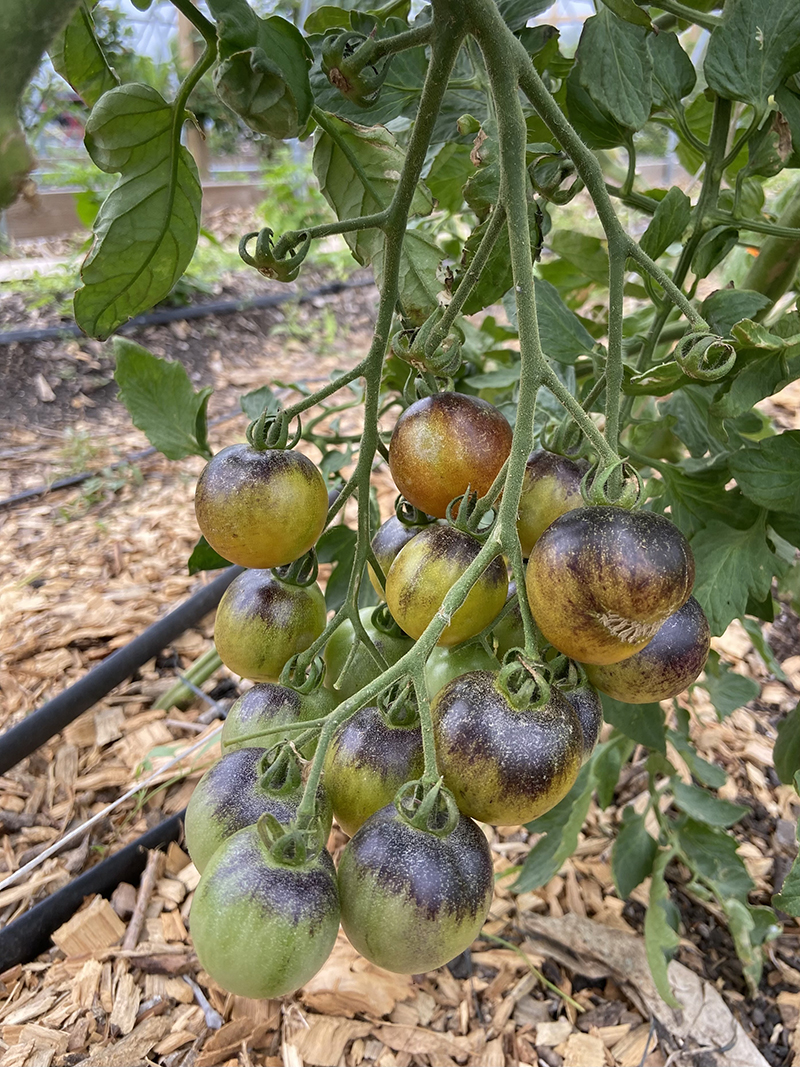
In addition to growing broccolini and goji berries and 17-inch carrots, the Clavieres are growing community. Their farm memberships — by the season or by the year—allow people to shop at their Sunday farm stand, to take classes at a discount, and to receive free access to seasonal events, like a family-friendly harvest experience. This year, Talking Tree Farm welcomed more than 80 homeschool families to its outdoor classroom. There are also plans for new programs. If you come on a Sunday, you might get to hear a little music, with Brandon on guitar and Sylvain on percussion. If the trees are already talking, why not join in with song?
Sarah hopes to encourage other young families to return to farming the land themselves. “I’m very motivated to find ways to make this model more appealing for young people, where they don’t have to have another job or two to make this work and provide for your family. Where they don’t have to learn so much of this through trial and error, like we did,” she said.
Not everyone will choose to live like the Clavieres, but we all can support small farms like Talking Tree Farm. “We need for people to support farmers with dollars. If you like certain vegetables, make a habit of sourcing them from your farmer,” Sarah said.
Or if you want to get your own hands in the soil, start small. Set yourself free from the high price of grocery store herbs. “It doesn’t have to be a lot,” said Sylvain. “Maybe basil in a pot.”


